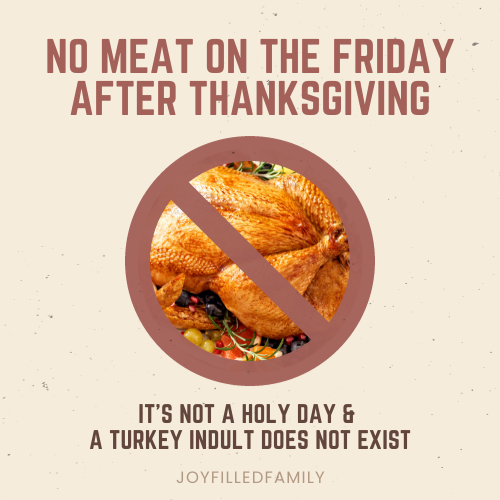There is often much confusion when it comes to observing the fast and abstinence laws of Holy Mother Church. I can’t say that we have it all figured out. But I will say that we have opted to stick with tradition (before certain conciliar changes were made) as far as we’re able. We continue to learn from holy shepherds who have not compromised the Faith and do better as we go.
The traditional observance for Fasting & Abstinence (observed since 1952) is as follows:
All persons over seven years of age must abstain. This means that they may not take fleshmeat, meat gravy, or meat soup at all on days of complete abstinence, which are all Fridays (except on holydays of obligation), Ash Wednesday, Holy Saturday (until noon), and the Vigils of the Immaculate Conception and Christmas. They may take meat, but only at the principal meal, on days of partial abstinence, which are Ember Wednesdays and Saturdays, and the Vigils of Pentecost and of All Saints’ Day.
All persons over twenty-one and under fifty-nine years of age must fast. This means that on a fast day they may have only one principal or full meal and two smaller meals. They may eat meat at this principal meal, except on days of complete abstinence. At the two smaller meals they may not have meat, but they may take sufficient food to maintain their strength. However, these two smaller meals together should be less than a full meal. Eating between meals is not permitted, but liquids, including milk and fruit juices, may be taken any time on a fast day. The days of fast are the weekdays of Lent including Holy Saturday (until noon), the Ember Days, and the Vigils of Pentecost, the Immaculate Conception, All Saints’ Day, and Christmas.
Those not bound to fast may eat meat as often as they wish, except on days of complete abstinence (when it may not be eaten at all), and on days of partial abstinence (when it may be eaten only at the principal meal). When a person’s health or ability to work would be seriously affected by fasting or, in even rarer cases, by abstaining, a traditional priest/confessor should be consulted to determine whether the law obliges.
In granting these concessions, the bishops urged the faithful:
- to attend daily Mass during the period of fast and abstinence [if this is not possible, one might say all or part of the Divine Office, the Little Office of the Blessed Virgin Mary, or the Most Holy Rosary]
- to receive Holy Communion often
- to take part more frequently in exercises of piety
- to give generously to works of religion and charity
- to perform acts of kindness toward the sick, the aged, and the poor
- to practice voluntary self-denial
- to pray more fervently
Given that the Friday after Thanksgiving is NOT a holy day, we observe the complete abstinence laws.
In regards to the “Thanksgiving Day Turkey Indult,” there does not seem to be one. You could learn more about that, here, here, or here (with a follow-up, here).
Benedic, Domine, nos et haec tua dona quae de tua largitate sumus sumpturi, per Christum Dominum nostrum. Amen.
Bless us, O Lord, and these Thy gifts which we are about to receive from Thy bounty, through Christ, Our Lord. Amen.
Here is a Pinterest Board that I created to give meal ideas using Thanksgiving leftovers.
Another one for general recipes for Friday Meals:
Agimus tibi gratias, omnipotens Deus, pro universis beneficiis tuis, qui vivis et regnas in saecula saeculorum. Fidelium animae, per misericordiam Dei, requiescant in pace. Amen.
We give Thee thanks, O Almighty God for these and all Thy benefits, Who livest and reignest world without end. And may the souls of the faithful departed, through the mercy of God, rest in peace. Amen.

Leave a Reply